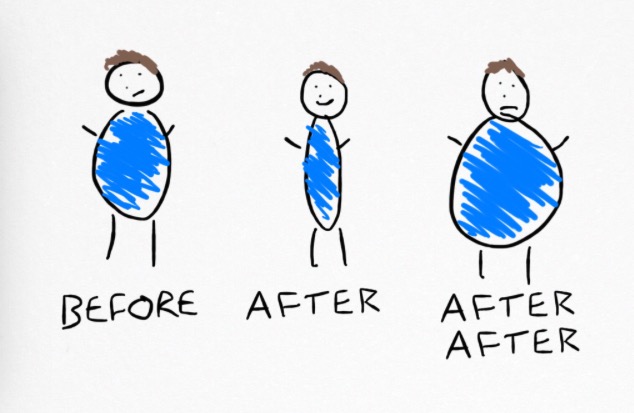3 Top Reasons For Regain After Weight Loss Surgery

So why is it that so many will fall short of losing the optimal amount of weight for their health and will actually regain within 3 years much if not all of the weight they lost? Some studies say 1/3 of patients will regain most of their weight post-surgery. I think the number is actually higher because many people who regain simply fall out of contact with their bariatric surgeon and support staff because they feel ashamed, so the statistics do not include these people. So, why do most people regain the weight? What can you do to help insure that you will be one of the successful long-term losers of your excess weight? By examining why people fail you can create a plan for how you will succeed.
The government agency, National Institutes for Health (NIH) defines weight-loss surgery as "merely a tool that helps people get a new start toward maintaining long-term good health. The surgery alone will not help someone lose weight and keep it off. Together with a reduced-calorie and low-fat diet and daily exercise, surgery will help an individual lose weight and maintain the weight loss.” Please read that a few times. That is how important this quote is! The surgery alone will not help someone lose weight and keep it off.
We as weight-loss surgery patients have a history of seeking comfort, happiness and pleasure through food. We wouldn't be here if that weren't true. Me included. The process of surgically altering our anatomies does nothing to remove from us the tendency to seek comfort in familiar ways but assures there will be physical suffering if we do. Post-surgery we will still have the same brain that is used to comforting us with food, and we will still have the fingers and the arms that are used to lifting food to the same mouth to find comfort and pleasure. It is critically important that the WLS patient seek out new ways to soothe, comfort, and find pleasure in their world other than by eating.
ONE main reason patients regain their weight is they search for ways to get around the surgery, still thinking of food as primarily a source of pleasure, not a source of fuel that can be pleasurable. This is often done relying on liquid calories, which may pass more easily, like high calorie coffee or juice bar drinks or alcohol. This is also done post-operatively by trying to maintain the presence of “trigger foods” in their lives. “Trigger foods” are often foods from the patient's past that helped cause obesity, do not satisfy hunger but instead create a craving. Many are high-calorie and highly processed, not nutritious. Trigger foods can include chocolate, chips, crackers, bread, cookies, ice cream, pudding, lattes, frapuccinos and alcoholic beverages. Really, any food can be a “trigger food” if there is so much pleasure in the “mouth-feel” or taste that repeating the pleasurable experience takes on more importance than actually feeding hunger. Very successful patients cultivate a mostly trigger-free post- surgical life. Bariatric surgeons and the NIH know the most common reason for regain and the most common post- surgical complication is “noncompliance.” Non-compliance is a fancy word that means the patient is not eating and exercising the way he/she agreed to before surgery. These people “talk the talk.” The successful patient “walks the walk” after surgery and changes how they eat and move.
A SECOND reason people often regain beginning in the second or third year post-op is that the “honeymoon” is over. The “honeymoon” generally encompasses the first 12 to 18 months post- surgery. During this time many patients will say, "I could eat all the chocolate and ice cream I wanted and still lose weight. I didn't have to try and the weight just came off.” This is often true because the body has been through such a shock after surgery that it takes months for the body to reset itself and learn to function with its' new physiology. Patients who regain their weight often believe that this “honeymoon period” is the new way that it will always be and don't adopt healthy eating patterns. So when their “honeymoon period” ends as it will they believe that the surgery has somehow failed them. In reality they have failed their surgery! During the first 12-18 months post-op it is essential to develop healthy patterns around food and exercise. This is the time when it is actually easiest to do and to not do so wastes a once-in-a-lifetime opportunity to begin a great new life with positive momentum.
A THIRD reason many patients regain much of their lost weight is a lack of support. Humans are social animals and we desire and need the support of each other throughout our lives. For thousands, if not tens of thousands, of years people coming together as a family or a community over food has been a way we connect with each other. Post-surgery, when the patient isn't able to eat what others are eating or in the quantities others are eating, or others are eating their 'trigger foods”, life can feel very stressful and lonely. This can be compounded by being around unsupportive people or people who want to be supportive but don't know how. Patients fail by not surrounding themselves with supportive people in a safe environment where they also must be accountable for their actions and behavior with food and their bodies. It is key to have a community of professionals and non-professionals who understand the challenges and hardships faced by those carving a new life with a new anatomical structure. There are online and in-person support groups. Even patients who've gone abroad for weight loss surgery can often use the support services available with their local medical group's Bariatric department. Creating relationships that support and assist you in becoming a healthier person and that hold you accountable for making healthy choices are key.
These are my top three. What would you add to this list? What plan will you create to deal with the items you add to this list? Who will support you on this journey of your life.....for your life?
I wonder if anyone who had WLS eats like I do? I eat until full (which doesn't take much), but what I want. I don't worry about good fats like avocado and olive oil. I don't eat bread because there is no nutritional value and it takes up too much space. I am generally eating what feels the best which is fish and vegetable with occasional sweet potato. I feel like the return to looking at my food as nutrition rather than living to eat has really changed. I know that there will be hugs pitfalls if I don't follow a healthy diet and supplement plan. What I see and often do is such an emphasis and worry about fats and if a food is safe. I am wondering out loud if the focus would not get so off track after the "honeymoon" period if the focus was always to eat a healthy diet. I don't feel that I need worry about amount or calories and maybe? this is how smaller normal people eat?
MBM1Forever: "I am wondering out loud if the focus would not get so off track after the "honeymoon" period if the focus was always to eat a healthy diet." RIGHT ON!!
As a clinical therapist with over 20 years of counseling experience, and a newly sleeved person, I spent over a year researching procedures before actually getting the surgery. I am finding that what are often presented as scientific facts is more like a hypotheses of how surgery works. The surgeries used are still in their infancy and much is still unknown about their processes. When I read some of the other members posts on this forum, it becomes obvious that misconceptions about weight loss surgery abound and that we must do a better job of equipping surgery candidates for the long term change necessary for successful maintenance.
It takes a combination of so many things in order to achieve sustainable weight loss, no matter which method to lose weight is chosen. Personally, after having the surgery, I believe that most people are more likely to revert back to old cues in their environment, emotional triggers and biological "set points" without guidance and serious effort to change. Working on those things for myself right now. Hopefully more research will provide answers that can better predict one's genetic predisposition and make more tools available for anyone with obesity and its comorbidities.
Given all the variables, it is important not to lay blame upon the persons struggling with their weight loss, until more information is available. Making a blanket statement about what causes weight regain is making assumptions which do not apply to the whole population and may not be rooted in the scientific facts. Biology is a powerful thing which wants to maintain homeostasis. Hormonal influences just may be at the heart of the matter.
Best of luck to all of us in reaching and maintaining our goals.
As a clinical therapist with over 20 years of counseling experience, and a newly sleeved person, I spent over a year researching procedures before actually getting the surgery. I am finding that what are often presented as scientific facts is more like a hypotheses of how surgery works. The surgeries used are still in their infancy and much is still unknown about their processes. When I read some of the other members posts on this forum, it becomes obvious that misconceptions about weight loss surgery abound and that we must do a better job of equipping surgery candidates for the long term change necessary for successful maintenance.
It takes a combination of so many things in order to achieve sustainable weight loss, no matter which method to lose weight is chosen. Personally, after having the surgery, I believe that most people are more likely to revert back to old cues in their environment, emotional triggers and biological "set points" without guidance and serious effort to change. Working on those things for myself right now. Hopefully more research will provide answers that can better predict one's genetic predisposition and make more tools available for anyone with obesity and its comorbidities.
Given all the variables, it is important not to lay blame upon the persons struggling with their weight loss, until more information is available. Making a blanket statement about what causes weight regain is making assumptions which do not apply to the whole population and may not be rooted in the scientific facts. Biology is a powerful thing which wants to maintain homeostasis. Hormonal influences just may be at the heart of the matter.
Best of luck to all of us in reaching and maintaining our goals.
So well said....I had gastric bypass over 14 years ago when there was no such thing as aftercare and support of any kind was almost non existent. Since I had surgery I have been volunteering in the WLS community full time and I've been in the trenches every single day. I personally believe that food addiction is one of the prime reasons for regain but many bariatric professionals don't even believe it exists. I am passionate about bringing food addiction into the discussion and I'll share one of my blog posts. It was only because I admitted my addiction that I was able to work on it and I'll be working on it the rest of my life. There is no shame...it is a disease. Here's that post.
http://www.bariatricgirl.com/2013/12/now-this-clarifies-food-addiction/
I wonder if anyone who had WLS eats like I do? I eat until full (which doesn't take much), but what I want. I don't worry about good fats like avocado and olive oil. I don't eat bread because there is no nutritional value and it takes up too much space. I am generally eating what feels the best which is fish and vegetable with occasional sweet potato. I feel like the return to looking at my food as nutrition rather than living to eat has really changed. I know that there will be hugs pitfalls if I don't follow a healthy diet and supplement plan. What I see and often do is such an emphasis and worry about fats and if a food is safe. I am wondering out loud if the focus would not get so off track after the "honeymoon" period if the focus was always to eat a healthy diet. I don't feel that I need worry about amount or calories and maybe? this is how smaller normal people eat?
I have changed the way I eat as well. I eat very boring things because I can no longer have "sex in a plate". (I hope that made sense) I have also recognized that because I cannot "eat just one" that it is easier to not eat any. I believe the reason it is hard for some people to eat like you do is because their addiction to food is severe and they haven't worked on the root issue. This is a great article about people who are abstainers (like me) and people who can eat moderately (they can eat just one).
Yvonne, I love your "sex on a plate" comment. There's a lot of truth in that for me.
Thanks Sara! I use it really often and I often wonder if people understand what I'm saying. I'm so pleased you were able to relate!
I love the link to the Gretchen Rubin article too. When I wrote in my article above that one of the ways people regain is to try to keep "trigger" or "comfort " foods in their lives in moderation I was trying to express what Gretchen Rubin is also saying. Many find abstaining easier and more freeing long term and more conducive to weight loss and a healthier relationship with food than trying to keep these foods in our lives in moderation.
The "sex on a plate" reference struck me as so helpful because when I and others I have worked with try to keep "comfort" foods in our lives in moderation it is easy to slide into a sensual relationship with the experience of intaking that food that takes on almost a sexual quality. The ingesting of it can become a rhythmic form of self-pleasuring that could almost benefit from a Barry White album playing in the background!
I'm still pre-op, but one thing I fear is the lack of support from my bariatric office. They have done a good job of informing me, and I have done a lot of research on my own, so I feel I am prepared. One thing Stevehud above mentioned is asking questions of your bariatric office, rather than on a forum or by other unqualified sources. I am afraid that will have to be me. My bariatric office never answers their phone. NEVER. It always goes to voice mail, and then often you don't get a call back. I understand that eager pre-op patients can probably be exhausting, but I think ultimately they are hurting the patient by not being a proper support for patients.
Why am I going to this office? Because my PCP has faith in this surgeon, and he is the most experienced in my area. I guess I will have to just pray everything works out well.
My surgeon's office has NEVER failed to answer the phone. Likewise, no one there I've ever left a phone message for has EVER failed to return my call.
I think your surgeon's office has a real problem.









SleeveandRNYchica 1,155
Posted
Great conversation and filled with all sorts of nuggets. Minus the biological and metabolic issues I would be inclined to include individuals that don't experience a "honeymoon phase."
First, what is that defined as? Is there a percentage of weight loss that one could/should achieve to indicate that they are indeed in a honeymoon phase? So with the sleeve I believe the number that is tossed around is that an individual may lose up to 60% of excess weight; how much of that is obtained during the "honeymoon phase?" Is there a correlation between the positive reinforcement of more immediate weight loss and reaching goal and maintaining.
Additionally, is it more of the average weight loss over the 18 month period that is more important to focus on. So many people go into this thinking they will lose over 8lbs a month and when that doesn't happen in the early stages it is truly a shift in expectation that needs to take place. Then add in when weight loss stalls after the 12 month mark after a slow road the frustration sets in and then old habits may return.
Share this comment
Link to comment
Share on other sites